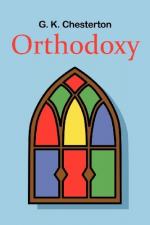
|
| Name: _________________________ | Period: ___________________ |
This test consists of 5 multiple choice questions, 5 short answer questions, and 10 short essay questions.
Multiple Choice Questions
1. What, according to Chesterton, is the proper place for humility?
(a) In a man's sense of ambition and effort.
(b) In a man's sense of conviction.
(c) In a man's view of himself.
(d) In a man's perception of others.
2. In the middle of Chapter One, why does Chesterton say this book is a joke on him?
(a) He wrote it so he could win a bet.
(b) He does not take its content seriously.
(c) He went looking for something that is already known.
(d) No one around him agrees with his argument.
3. How does H. G. Wells perceive categories of things?
(a) He says categories do not exist.
(b) He perceives twelve categories.
(c) He subdivides things into tiny categories.
(d) He notes five categories.
4. As revealed in Chapter Two, what is the secret of mysticism?
(a) A man can understand life through things he does not understand.
(b) A man can try to understand life through the supernatural.
(c) Mysticism provides a lens for understanding the supernatural.
(d) Mysticism leads to God, who has the answers.
5. What does Chesterton say happens when a skeptic revolts against everything?
(a) He learns to rebut every traditionalist.
(b) He loses his right to speak out against anything.
(c) He begins to distrust everything.
(d) He becomes excellent at tearing down established ways of thinking.
Short Answer Questions
1. How does Chesterton end Chapter One?
2. As the reader can infer from the beginning of Chapter Two, what is Hanwell?
3. In Chapter One, what has Christianity named the mixture of the well-known and the unknown?
4. Why does Chesterton say that satire is disappearing from modern literature?
5. How does today's skeptic compare to the skeptic of the French Revolution, according to Chesterton?
Short Essay Questions
1. Why does Chesterton's second notion of fairyland entail praise?
2. Chesterton asserts that though the world has its share of evils, the modern virtues actually have a more devastating effect. How does he support this radical idea? What relationship does this have to Christianity?
3. The only authority for Chesterton's argument is the Apostles' Creed. Is this more or less effective than appealing to the Bible as the sole authority?
4. Chesterton ends Chapter II, The Maniac, with a look at the true skeptic. What picture does this man present? How does he relate to the man at the beginning of the chapter, the man who believed in himself?
5. Considering the fact that elf land is more rational than the scientific world is, why does Chesterton say that magic flourishes in elf land?
6. Poetry is the only thing that keeps a man sane, while reason drives him insane. How does Chesterton support this argument, and is it plausible?
7. What is "the false theory of progress" (Chesterton 2000, pg 196)? What implications does it have for daily life?
8. In Chapter I, Introduction in Defense of Everything Else, Chesterton states that the book is written from his own experiences rather than as the result of research and labor. What expectations does this set up or destroy for the reader?
9. How does Chesterton explain the idea of the madman in life, in experience? How does this person live in the world?
10. In the example of the explorer who only discovers his own land, Chesterton says that his first emotion might be foolishness. This should not be the sole emotion, though. Why does Chesterton name foolishness as the first emotion and how might this fit the religious explorer?
|
This section contains 1,646 words (approx. 6 pages at 300 words per page) |

|




